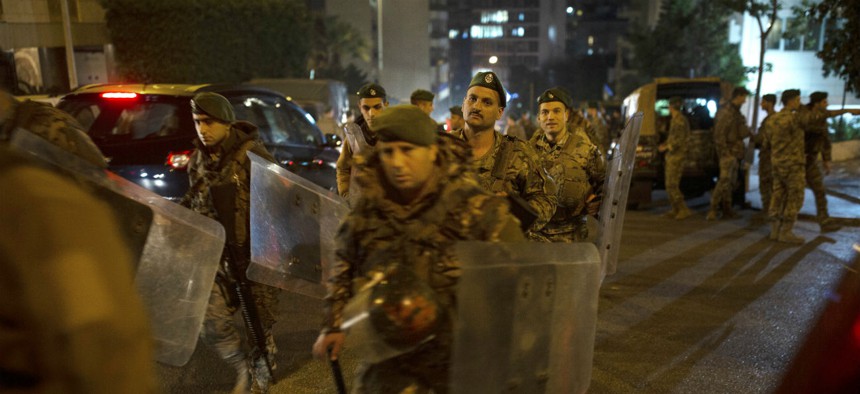
Lebanese security forces move into position outside of the home of newly-assigned Lebanese Prime Minister, Hassan Diab, following his meeting with Lebanese President Michel Aoun in Beirut, Lebanon, Thursday, Dec. 19, 2019. Maya Alleruzzo Alleruzzo
Federal Agencies Need to Improve Oversight of Security Aid to Lebanon
Hizbollah's influence “heightens the importance of ensuring strong management controls.”
While the State and Defense departments claim to be meeting U.S. security objectives in Lebanon, they do not collect key data on foreign aid performance and have failed to ensure that sensitive military equipment provided by the United States is properly safeguarded, according to a new watchdog report.
The presence of Hizballah, an Iranian-backed militia and political party, in Lebanon “complicates the U.S. relationship with Lebanon and heightens the importance of ensuring strong management controls over U.S. assistance,” according to the Government Accountability Office report issued on Dec. 18. The State and Defense departments administered approximately $1.5 billion in assistance to Lebanon from fiscal 2013 to 2018, the period covered in the review. In providing aid, which includes equipment and training, the United States has been focused on helping Lebanon strengthen its state institutions and bolster security to combat Hizballah and other terrorist threats.
“The Foreign Affairs Manual emphasizes that having targets to indicate the expected change over the course of each period of performance is a good practice,” according to GAO. “Several of Embassy Beirut’s security-related [Integrated County Strategy] indicators lack such targets, making it difficult for State to use the indicators to assess progress because it cannot compare the actual results of activities to the expected results.” For example, State did not identify how many people in Lebanon received security training.
Additionally, the Defense Department did not meet “timeliness standards for nearly one-third of all observations of sensitive equipment” given to Lebanese force, per department policy. This includes Hellfire missiles, night vision devices, light attack aircraft, unmanned aerial vehicles and sniper rifles. If an inspection is late, it is considered “delinquent,” according to the department. As a result, the department “cannot fully ensure the equipment is properly accounted for and safeguarded,” GAO wrote.
In addition to the Beirut Embassy, the State Department’s International Narcotics and Law Enforcement Affairs, Political-Military Affairs and Counterterrorism bureaus and Defense Department’s Defense Security Cooperation Agency and Defense Cooperation for Budget Office are involved in managing the aid.
GAO recommended that the secretary of State direct the bureaus involved with the aid to work with the embassy to establish and standardize performance indicators and then collect and review the data from the indicators. Additionally, the report recommended the Defense Department change its inspections review process to conduct annual reviews of equipment. Both departments concurred with the recommendations.
GAO conducted the audit by reviewing documentation and interviewing State, Defense and Lebanese government officials from October 2018 to December 2019.
The report comes after the Trump administration earlier this month lifted a “mysterious” hold of $105 million in aid to Lebanon “that budget officials had imposed without explanation,” according to the New York Times. That aid was not part of the GAO review.







